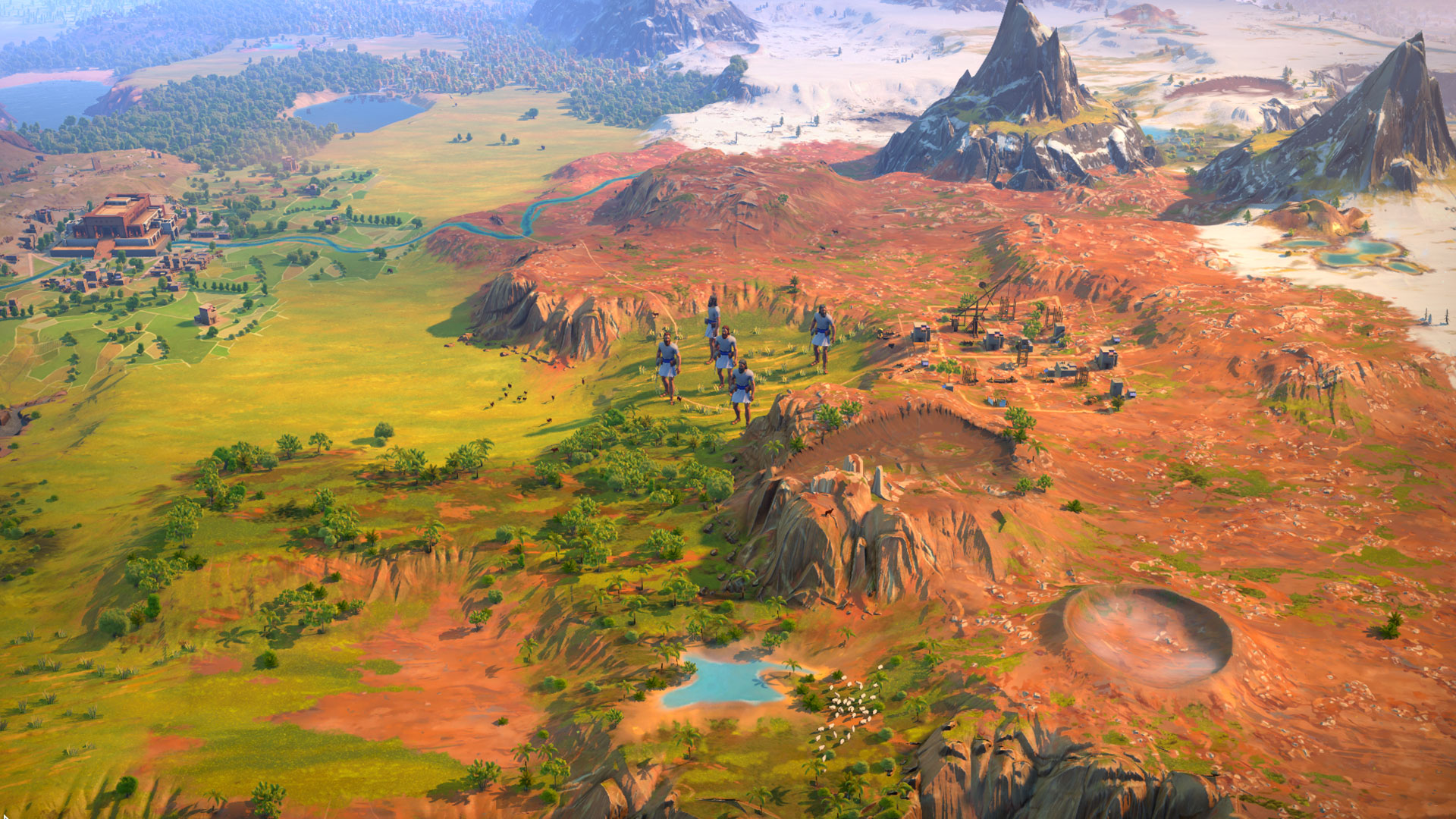GamesRadar+ Verdict
Embracing player motivations from start to finish, Humankind refreshes the 4X genre – even with a couple of technical kinks.
Pros
- +
Culture shuffle system prevents mid-game slog
- +
You can win by being the most famous farmer, if you want
- +
Narrative events & civics create unique playthroughs
Cons
- -
AI pathfinding is sometimes easily distracted
- -
Easy to hit a fame victory without reaching final era
Why you can trust GamesRadar+
Humankind strips away the victory conditions of other 4X games and replaces them with a single metric: fame. While this isn’t wholly unique – it functions on a similar level to Civilization’s score victories – it brings the ‘backup victory’ front and center. No longer totting up the interesting things you did as a sort of tie-breaker, the interesting things you do are the point. Charting a new continent? Fame. First to discover writing? Fame. Absolute best at farming? Fame.

Platform(s): PC, Google Stadia
Release date: August 17, 2021
Developer: Amplitude Studios
Publisher: SEGA
You start the game off in the Neolithic era, without any kind of culture yet. Your culture defines who you are in any given era – from Ancient Egyptian builders to British expansionists – but that can't develop in a vacuum, so your first job is to get the lay of the land. As you explore, hunt, and fight other settlers, you accumulate the influence needed to settle your first outposts, which will eventually become your sprawling cities. Hitting certain milestones garners you era stars (which in turn earn fame), and it only takes one before you can pick your first culture and move on to the Ancient Era – or lurk in the Neolithic Era to keep picking up stars, and fame.
Each culture has a key strength - like expansion, agrarianism, or science - and getting era stars for that particular strength earn you an inch more fame than the other kinds of achievements. So for the Ancient Olmecs, who I first played as, their strength was aesthete - with an emphasis on diplomacy and influence. That strength came with a skill I could use to bring a territory of mine back under my sphere of influence by pushing works of art, potentially flipping nearby territories too. It felt so sneaky the first time I realized what had happened, but when you get another empire’s territory fully under your sphere of influence, it pings a grievance on your behalf, so you can say: “hey, I think those look like my people, not yours – guess we should we renegotiate those borders, huh?”
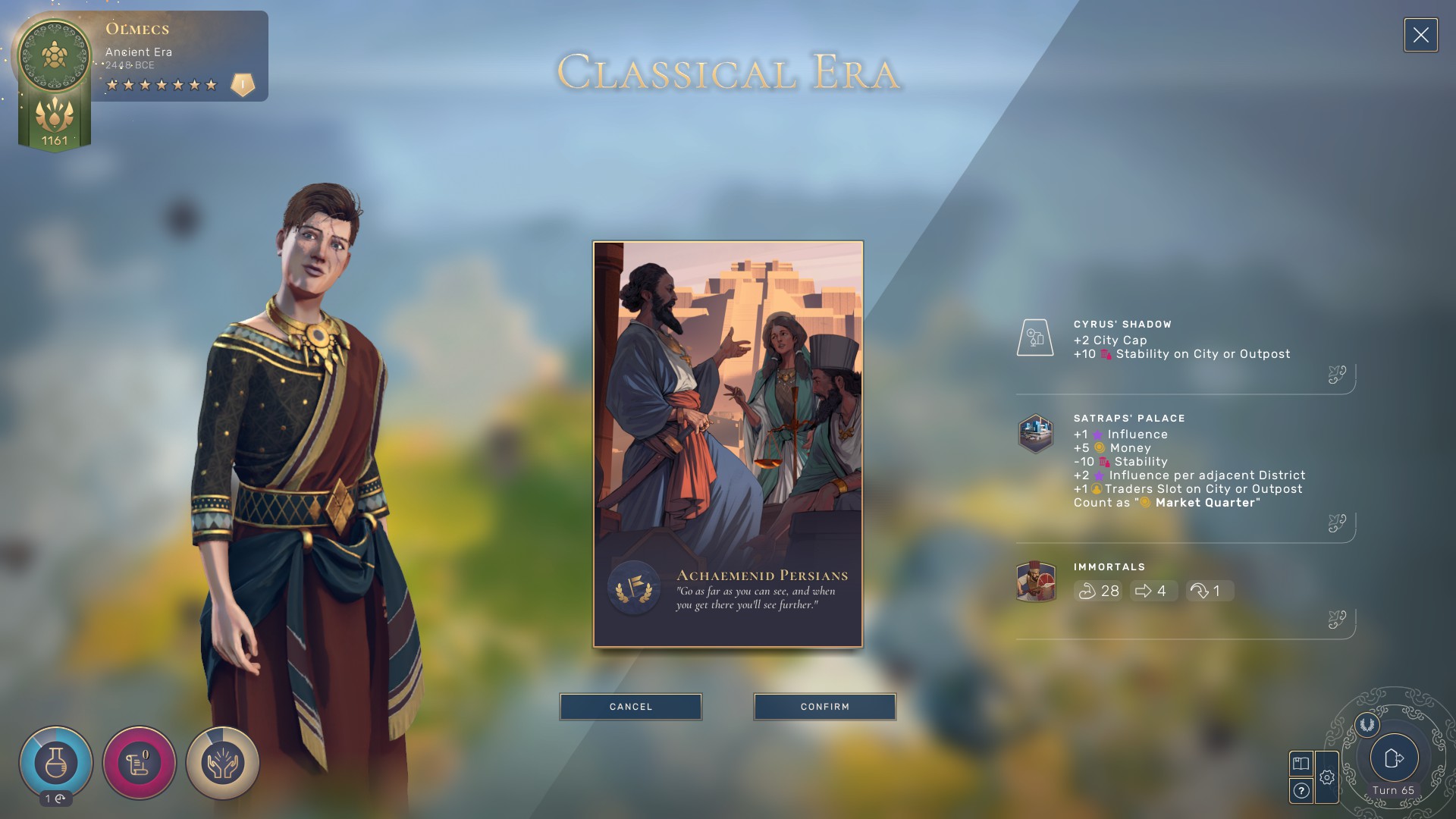
I’ve never been one for the extermination part of 4X games, so these more diplomatic forms of expanding territory delight me. You can’t play quite the long game as you would in a grand strategy, but the transparent cause-and-effect of grievances and demands adds up to a system that just makes sense. When you press a demand, it cuts off trade routes, as well as either side’s ability to improve on treaties or start alliances. If someone is really dependent on access to your iron – well, they should consider not accidentally owning some of what is obviously your land, then.
Even if I don't care for extermination, Humankind’s combat system is good. It huddles together multiple units into one army from the very beginning, with them unfolding into tactical positions only at the point of a skirmish, and speeds up turns with three back-and-forths in each one. I liked it well enough for hunting elephants and deer, but some absent-minded AI pathfinding put me off the idea of protracted war. For example, your armies cancel their tasks if their path gets interrupted (by say, a cliff), so they need reminding what to do – and to not drown themselves, once allowed in the open sea.
Ideological frenemies
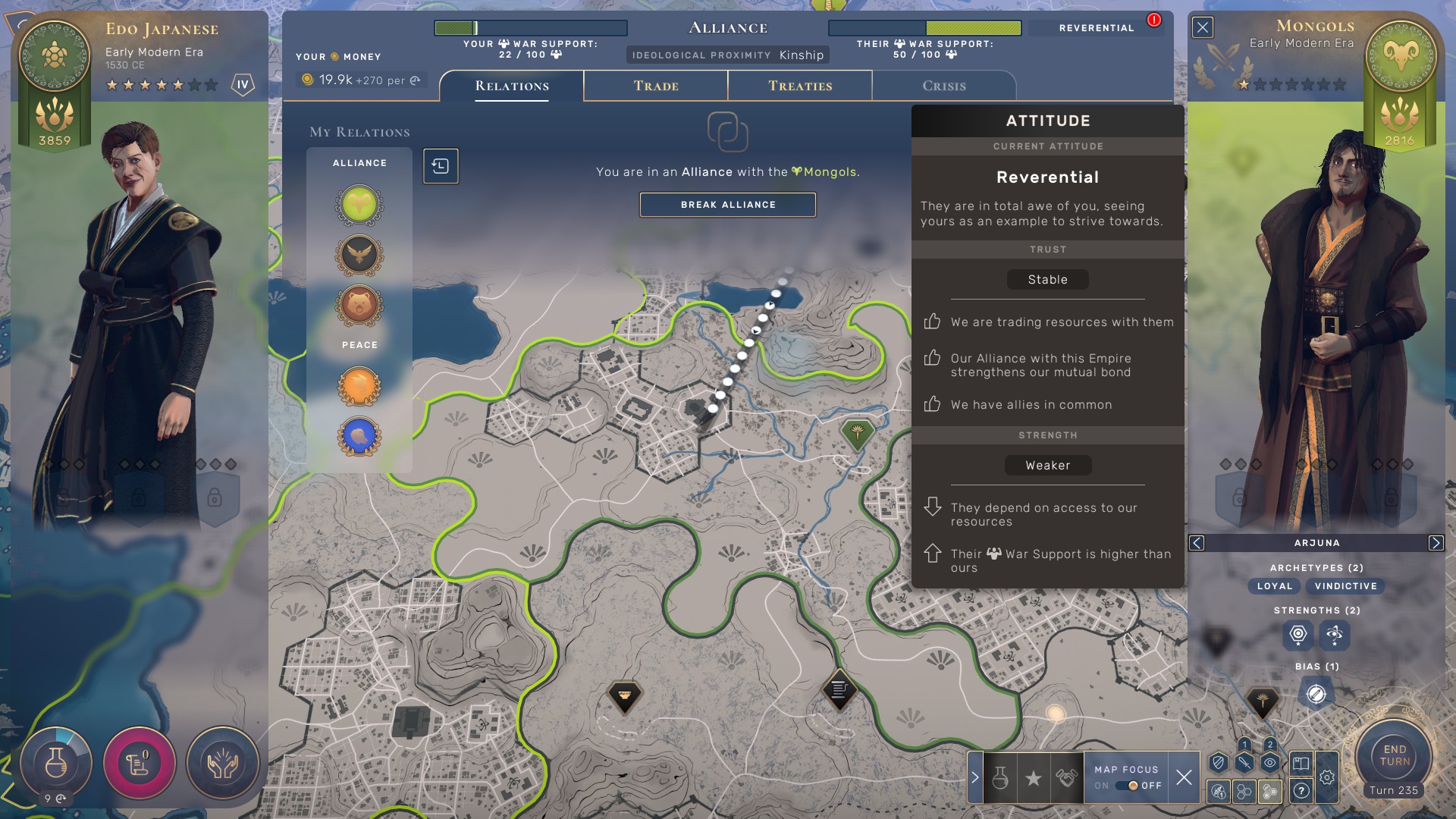
So after getting a taste for hunting deer and elephants, I stuck to bullying other empires the old-fashioned way. And I didn’t even need to bully all of them, as the game’s ideology system destined some of our empires to be fast friends. Narrative events (which pop up in response to your actions) and civics (which pop up in response to narrative events) determine your ideology: are you traditional, or more progressive? Collectivist, or individualist? What kind of society do you want to lead, O God Emperor you?
While your choices have mechanical effects, at the standard level of difficulty I didn’t notice them to be make or break – mostly I built the socialist empire of my heart, and tried not to think too hard about the inherent contradiction there. This emphasis on narrative events did make a playthrough feel specific though – I went through it thinking about how “next time” I might make different choices. What would happen if I took a different approach to religious freedoms? And what pithy observation would the narrator make then?
Weekly digests, tales from the communities you love, and more
Being the eternal God Emperor (and to be clear, this is my choice of words, not the game’s) does of course raise the question of the historical role of the cultures you play as. You aren't any specific figurehead, but your own custom avatar – a you-a-like with a cool facial scar, in my case. I don’t play games like these for historical accuracy, and it’s something Humankind’s marketing specifically declaims (“more than history, it is your story”) but it still gives me a moment to pause that each culture simply… succeeds the previous. The Ancient Olmecs were absorbed by the Achaemenid Persians, overtaken in turn by the Franks, who briefly entertained the Edo Japanese before taking back the stage as the French. It’s oddly benevolent – any power transition between your own empire and a competing one has to play out on the world stage, but era transitions simply are.
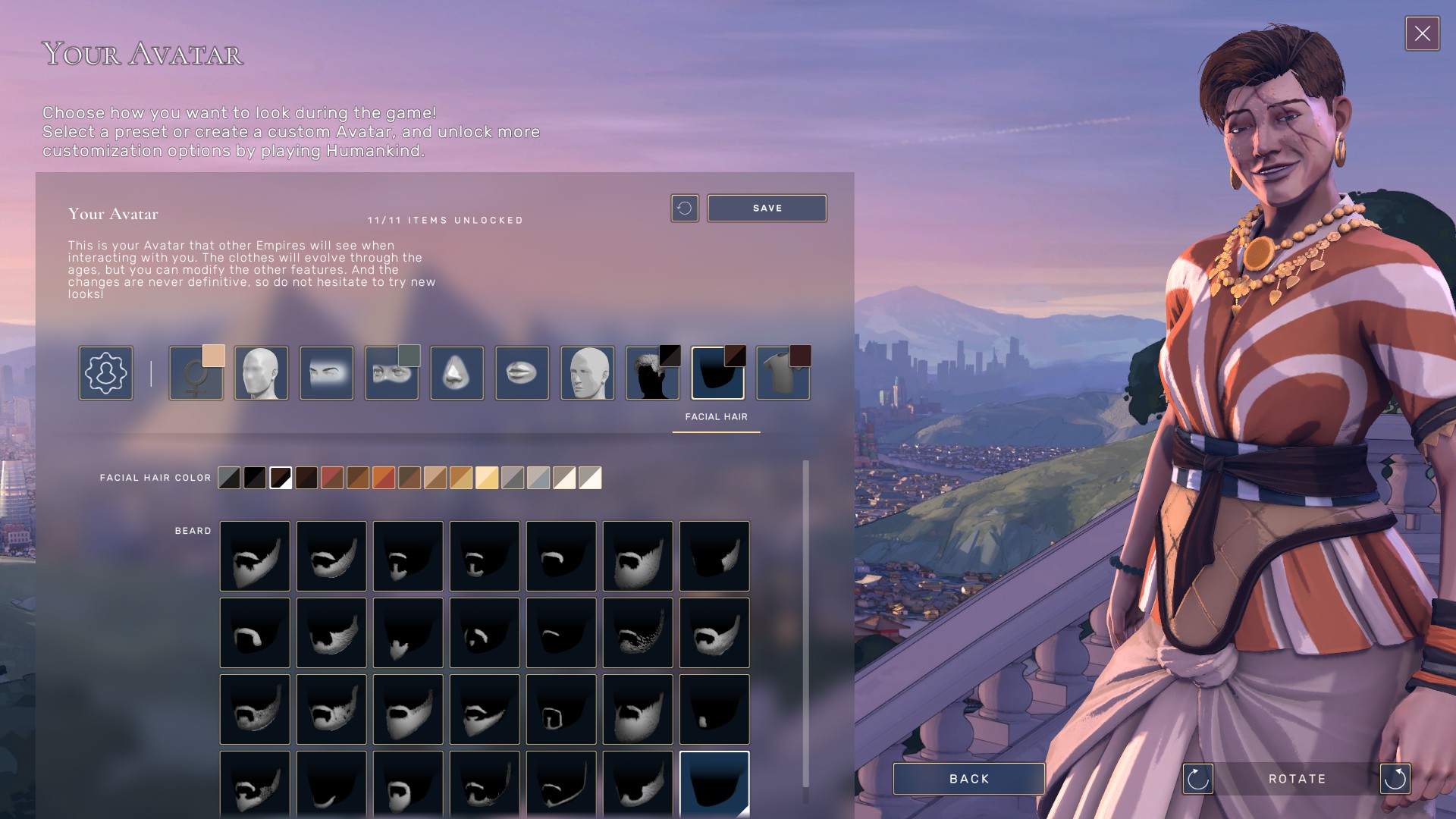
To put a pin in any conceptual issues, it’s this shuffling of cultures that keeps Humankind from becoming a slog. 4X games can often drag around the mid-game, where all the excitement happens around setting yourself up, and racing towards your end-game goals, and the middle is just… kind of chugging things along. Making numbers go up. With its stripping out of end-game goals, not only does Humankind just center the kind of play you find interesting, but you can also change that up to keep things both interesting and competitive, as each era’s culture is mutually exclusive – if another empire beats you to the post, you have to settle for second, third or fourth pickings.
So maybe you’ve been playing as an agrarian culture, until you set foot on a previously un-encountered continent (a competitive deed, good for you). A pivot to an expansionist culture might help you rack up extra fame from quickly settling the island or maybe you’ve just struck oil, and want to switch to a scientist culture to zip through the technology tree to exploit it. And of course, once you’ve made the best of your position, you can always switch in the next era to a culture who can make the best of building, and fill the rest of your land with trees instead – because pollution really starts stacking up come the industrial era. Though in my socialist utopia I nipped that in the bud as much as possible, so I never saw if that added up to anything substantial. Watching the number of pollutants tick up per turn certainly filled me with dread at 1am, however!
Pacing to and fro
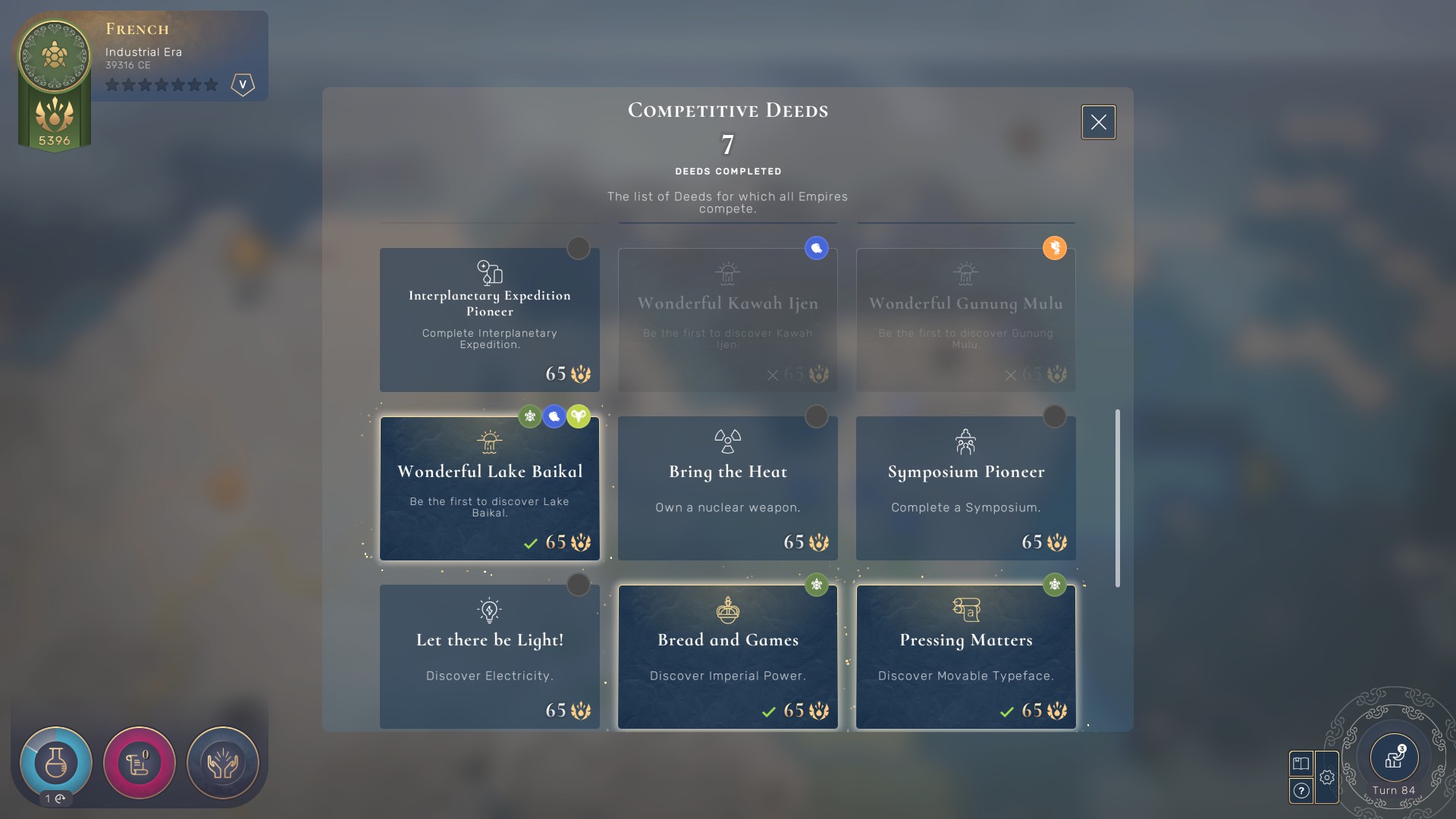
The one-more-turn phenomena driving me into the late night was very real – which is possibly just as well, because the game reached its natural end of 300 turns before reaching the final era. In a second ‘blitz’ length playthrough (75 turns), I finished in the industrial era, and decided to keep going after the ending to reach the contemporary era, and stop when I met one of the secondary ending conditions. It then took 60 more turns to get seven contemporary era stars. This isn’t game breaking – the secondary endings aren’t win conditions, only ‘early’ endings – but it’s certainly off, as you do want to see all the eras.
While a premature ending was possibly the most surprising, it wasn’t the only pacing issue I had. I was frequently notified that the population in one of my cities had decreased due to lack of food, when every other indicator suggested it should be increasing. There didn’t seem to be any status for a stagnant population – only growing, or starving, with mismatched communication between the two.
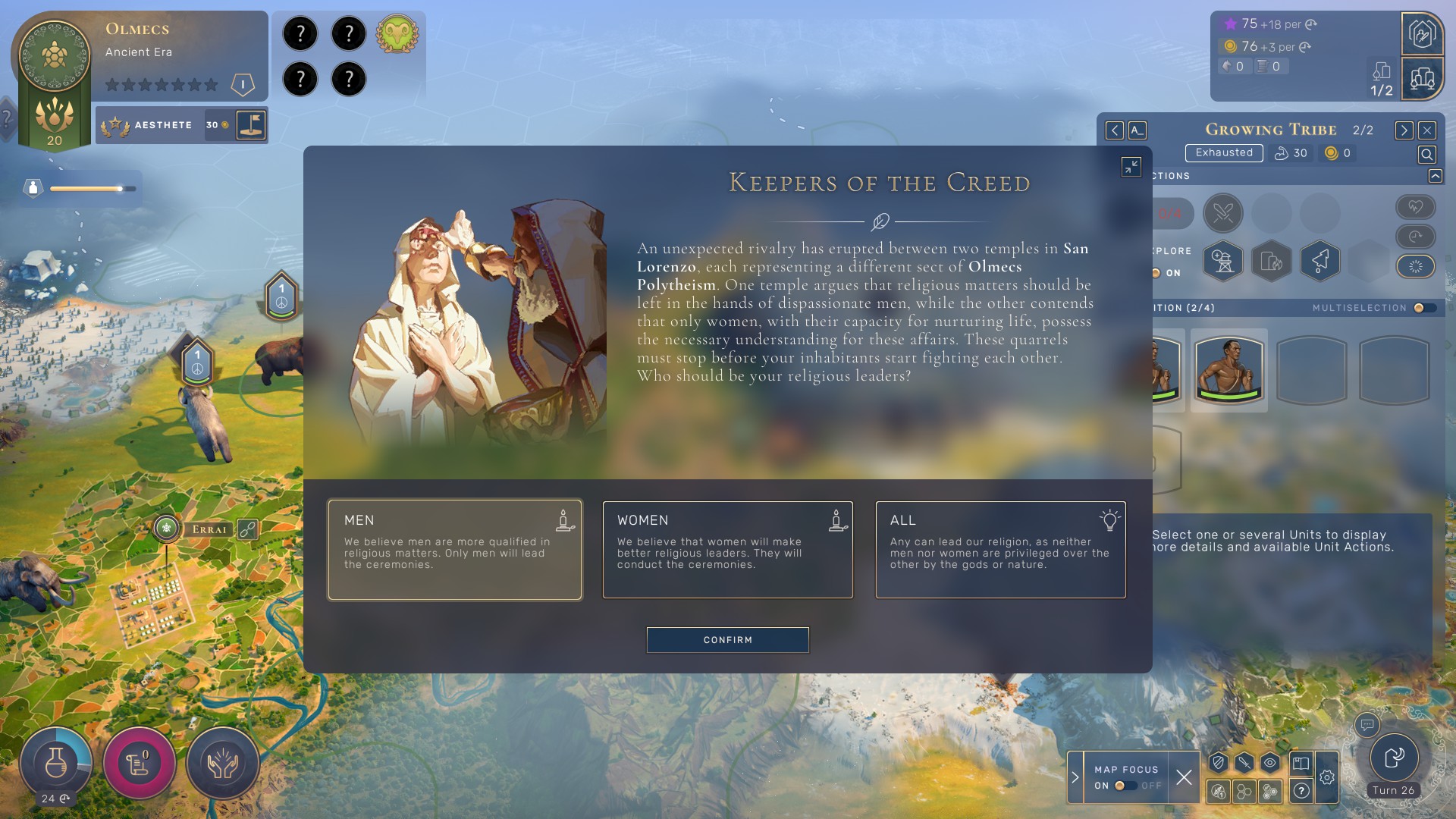
This issue, and one that popped up where I would get war status notifications about empires I was fairly sure I was not at war with, stood out so significantly because Humankind is otherwise notably good at communication. As someone who has to mentally filter out the majority of UI clutter in most games, Humankind is impressively intuitive in what it presents to you – no more trading your horses away because you’re not really sure what that means for you yet, or accidentally signing alliances with people who suck, or triple-checking if it was a woods tile or a forest tile that gave you better outpost benefits. It’s also just nice to look at with its strong colour direction and mosaic tile fields – though the main font used for narrative events isn’t the most readable, teetering on the overlap of being both low-contrast and visually complex.
Humankind may not reinvent the wheel, but it thoroughly buffs that wheel up. I didn’t even realise how many knocks that thing had taken until now. While I find its successionist approach to historical cultures odd, Humankind is, without hyperbole, one of the nicest 4X games to actually play. Every pain point traditional to the genre has been massaged away, and in its place is something somehow both player-led sandbox and competitive strategy. It might have a couple of technical issues to iron out, but its core design means there’s something for everyone. Bring on the world famous merchant-scientist-farmers.
Reviewed on PC with a code provided by the publisher.
More info
| Genre | 4X |
A critic and reporter who's written for outlets including Fanbyte, Rock Paper Shotgun and Unwinnable, Ruth is an indie game enthusiast who loves RPGs, strategy games, and - being an avid fan of musicals - anything that might make you cry.
